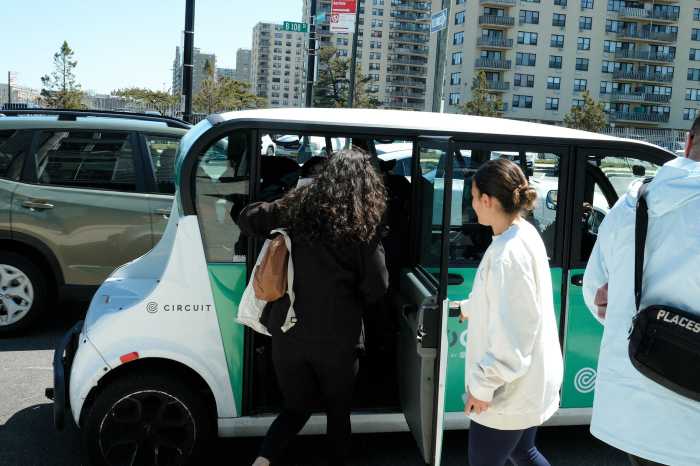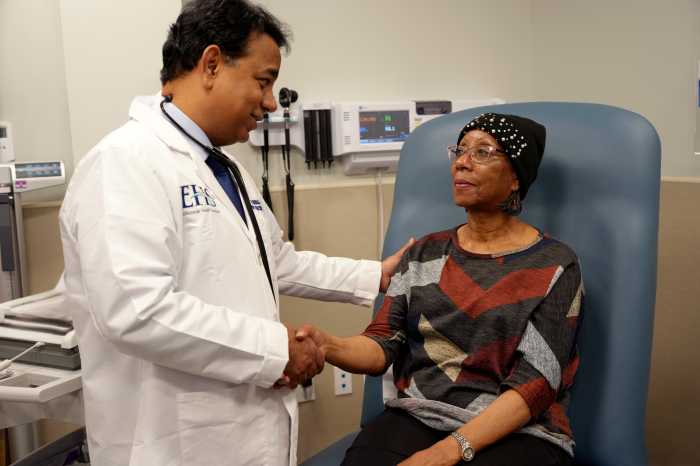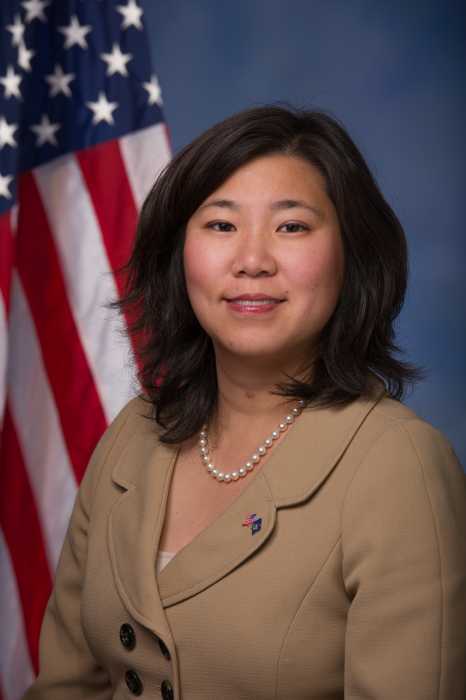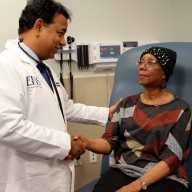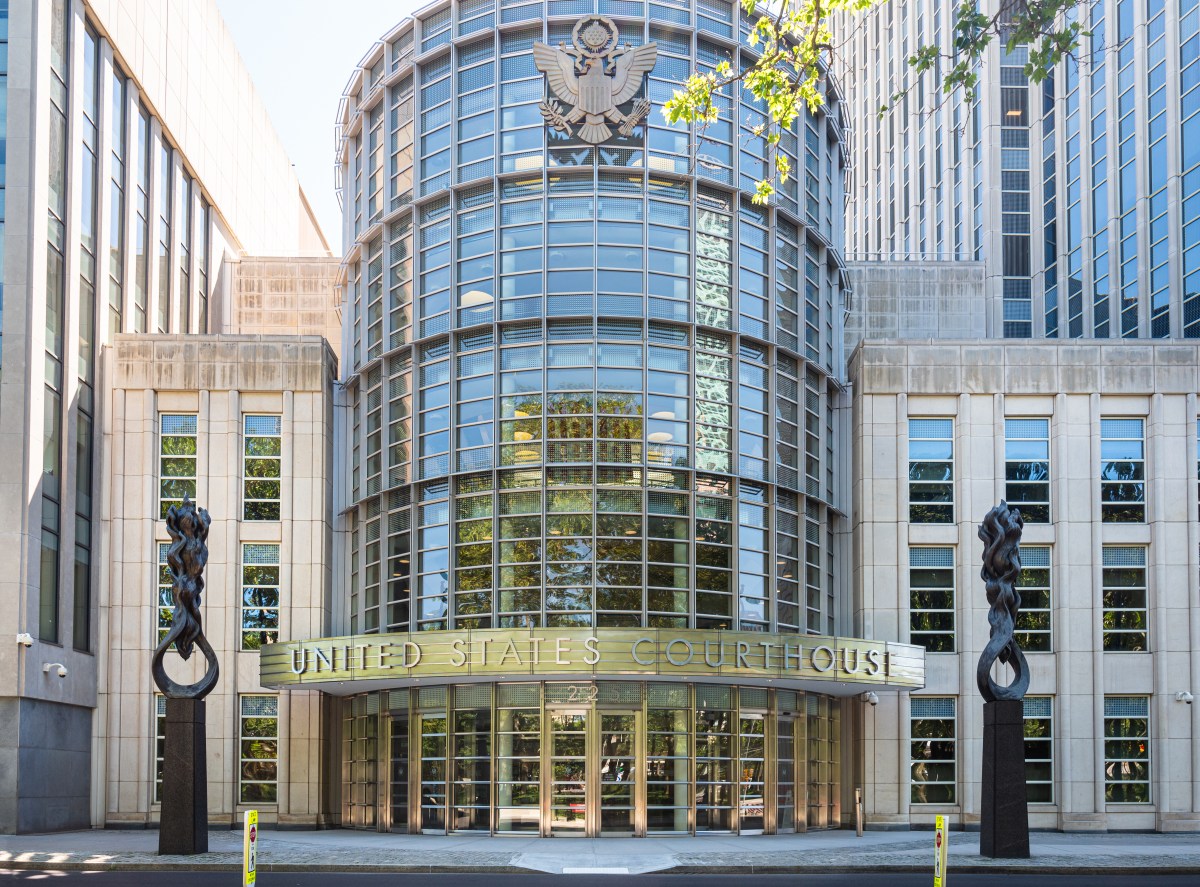Civic Reports On School Fight, Transit Issues
Ranking members of the Ridgewood Property Owners and Civic Association (RPOCA) updated residents on some of the issues they’ve been working on over the first three months of 2012 during their meeting last Thursday night, Apr. 5, at I.S. 93 auditorium.

Paul Kerzner, the civic group’s president, led an overview of a number of topics currently being addressed by the organization, including the impending closure and replacement of Grover Cleveland High School, transportation projects and street tree installations.
Speaking about the first topic on that list was the chairperson of RPOCA’s board of directors, Patricia Grayson, who announced that the civic group has sent a letter to Schools Chancellor Dennis Walcott outlining the group’s concerns regarding the “turnaround” plan for Grover Cleveland. last week’s Times Newsweekly, the Department of Education plans to implement the “turnaround” model at the Ridgewood school, resulting in its closure at the end of the current school year in June. Upon reopening as a new school on the Grover Cleveland campus in September, at least 50 percent of the current faculty may be replaced.
Grover Cleveland currently operates under a federal “restart” overhaul plan implemented last year. The city DOE nullified the plan after federal funding was lost due to its in- ability to reach a deal with the United Federation of Teachers (UFT) on a teacher evaluation program before Jan. 1, 2012.
Grayson stated that the school has made progress over the last year under the leadership of its new principal, Denise Vittor. Though Grover Cleveland had a “less than stellar” graduation rate for many years prior, she pointed out that school officials expect more than 60 percent of the current senior class to graduate in June.
“If they do close it on a Friday and reopen it on Monday, the same kids are going there,” she said, adding that the DOE is pulling “a stability rock, and that’s really what it is. Young people, as much as they deny it, want stability.”
“Their basic premise was ‘Please don’t close us. Please leave us with the teachers that we have. We are doing very well, and you pulled the rug out from under us,'” Grayson said regarding the public hearing held at Grover Cleveland last Monday, Apr. 2. “The general spirit from the neighbors and students and teachers was that they wanted to remain together. They wanted to prove that the program is working, and they need a little more time.”
Kerzner then read the civic group’s letter to Walcott, which urged that the DOE allow several provisions if the Panel for Educational Policy adopts the turnaround plan for Grover Cleveland. They urged that Vittor be allowed to remain the principal and to make teacher hiring decisions on her own accord. The civic group also asked the DOE to retain the Grover Cleveland name.
Regarding other school matters in Ridgewood, Grayson informed residents that the School Construction Authority plans on building a brand new primary school on the site of the defunct St. Aloysius School at 360 Seneca Ave. The site is located across the street from P.S. 305, which has youngsters from pre-kindergarten through second grade.
Currently, P.S. 305 students are zoned to attend P.S. 81 after completing the second grade; the new school at the St. Aloysius site, if built, would present an alternate location for those students to attend and alleviate overcrowding at P.S. 81, Grayson indicated.
Finally, the SCA is continuing to construct a new elementary school, P.S. 290, on the former Rite Aid pharmacy site located at Metropolitan Avenue and Tonsor Street. The school’s first class, however, is currently in operation at the campus of I.S. 73 in Maspeth.
Transit update
John Maier, RPOCA’s first vice president, reported that the Metropolitan Transportation Authority (MTA) is making plans to bring improvements to the Fresh Pond Road, Forest Avenue and Seneca Avenue stations on the M line.
As part of the MTA’s station renewal program, Maier explained that crews will make improvements to the mezzanines, platforms and stairwells at each train station. The most significant overhaul will be made at Fresh Pond Road, where the mezzanine will be reconfigured to have entrance turnstiles at both ends and a centralized token booth.
Platform and stairwell repairs will be made at the Forest Avenue and Seneca Avenue stations, he added.
The renewal projects are slated to begin later this spring, and once it starts, riders can expect to see weekend service disruptions on the M line, Maier said. Representatives from the MTA have been invited to RPOCA’s May meeting to discuss the plans further.
Community Board 5 is also looking to host a bicycle forum in early June to invite residents to provide their input on establishing bike lanes around the area, Maier said. The session will allow residents to meet with representatives from the Department of Transportation to discuss the expansion of the “Complete Streets” bike lane network across the city.
Maier stated that RPOCA recently provided its recommendations on creating bike lanes on Woodward and Onderdonk avenues to connect bicyclists from Metropolitan Avenue to Cypress Hills Street, which is part of the Brooklyn-Queens Greenway.
Street trees and trash
During a recent hearing at Queens Borough Hall in Kew Gardens regarding capital and expense budget priorities for the 2013 fiscal year, Kerzner stated that the organization urged that Ridgewood’s two City Council members allocated funding for the installation of new street trees.
Kerzner stated that the group asked City Council Members Elizabeth Crowley and Diana Reyna to each provide $625,000 in funding (a total of $1.2 million) to install over 1,500 trees across the Ridgewood area. The average cost for the city to purchase and plant a new tree runs to about $800, he explained.
If approved, the RPOCA would seek to plant the trees at hundreds of locations logged by the group in its street tree survey conducted in 2007. Members of the civic group walked around the neighborhood and identified spots where a tree would be suitable, including locations with stumps or empty tree pits.
Kerzner noted that the civic group attached the list of locations on its survey list to the formal funding requests made to Crowley and Reyna.
Regarding sanitation issues, the civic president stated that he recently met with the new Sanitation Department superintendent, William Doak, regarding illegal dumping at public waste baskets along Fresh Pond Road in Ridgewood.
Kerzner stated that he inquired as to why eight litter baskets were placed at certain corners instead of the standard four receptacles. He told Doak that the additional baskets served as an invitation to local residents and business owners to illegally dispose of their trash in the public cans.
“The more baskets you put out, the more they’re going to be abused,” he said. “You’re enticing them to do it.”
Kerzner suggested that the Sanitation
Department remove public waste baskets from certain locations along Fresh Pond Road. He also learned that the Sanitation Department would begin “staking out” certain intersections in the hope of finding illegal dumpers who use the public receptacles.
A CSA for Ridgewood?
Several guest speakers who were invited by the RPOCA to provide a presentation on community supported agriculture (CSA) programs were unable to attend last Thursday’s meeting, Kerzner announced. The civic group would try to have representatives of a CSA program at a future meeting.
Kerzner stated that the RPOCA is considering forging a CSA agreement with a farm in the New York City metropolitan area to provide Ridgewood residents who register with fresh produce on a weekly basis for up to nine months a year.
In a CSA agreement, a group of individuals pays a set fee to the farm in order to grow desired crops such as corn, tomatoes, apples and lettuce. Every week from spring through fall, the farm delivers the produce to a collection point in the neighborhood- generally on a Saturday morning, Kerzner noted-where the products are divided and distributed to CSA members.
“Whatever’s in season, you’re going to get in volume,” he said.
Those who sign on for the program will pay a one-time fee which averages to about $45 a week. The RPOCA president stated that a family of four would wind up paying double the average fee if they purchased the same amount of produce at retailers in the city.
The next Ridgewood Property Owners and Civic Association meeting is scheduled to take place on Thursday night, May 3, at 7:30 p.m. in the auditorium of I.S. 93, located on Forest Avenue between Madison and Woodbine streets.


